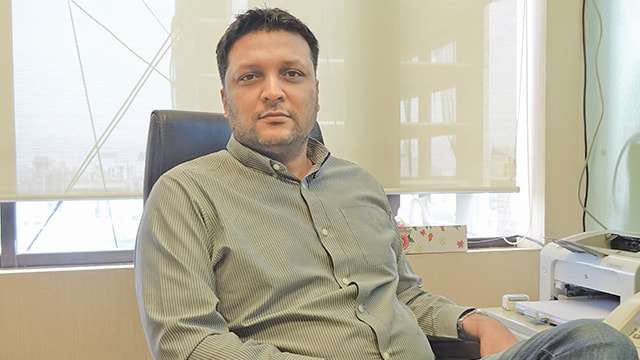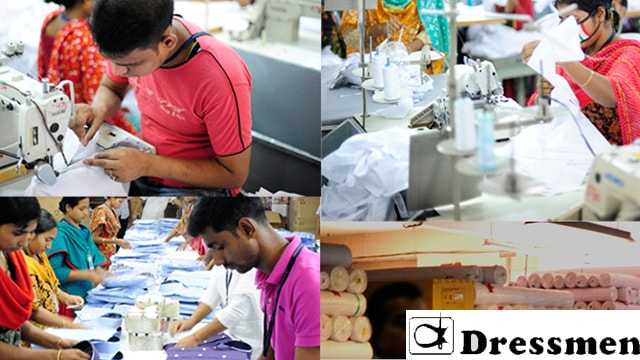
Evolution is as much essential for success in any business as it is for apparel! As socio-economic conditions undergo changes, markets go through the cycles and products reach saturation making way for the new ones. In such a scenario, transformation is the only option to maintain business growth and financial viability. The difference between a successful and an extinct business thus is the recognition and successful execution of transformative processes, and who better understands the same than the young and suave Director of the more than three-decade-old Dressmen Limited, Maashed R Abdullah , a Graduate from Indiana University Bloomington (Bachelor of Science in Apparel Merchandising and Business Entrepreneurship), responsible for the Group’s Marketing, Development, Social Compliance, Information Technology and Quality Departments.
Established in 1984 as a partnership business with just 60 machines and 150 workers under a project loan from Pubali Bank Ltd. under the leadership of Managing Director and Chief Executive Officer Hasan Abdullah , Dressmen has come a long way. At present, it owns five production units with a combined workforce of 4000 workers and plans to establish a couple of more units soon to be considered one of the top garment manufacturers and exporters of Bangladesh. Living up to its reputation, Dressmen has always embraced the path of evolution to maintain its relevance in these changing times.

“Business dynamics have been changing rapidly and if one has to stay in the race, there’s no option but to think out of the box and keep evolving… After every 3-4 years, one has to change the game plan in this business and we are currently exploring all the possibilities,” Maashed declares, underlining Dressmen’s evolving business strategy in terms of markets, products, alliances and innovations. Counting USA as its primary market so far (accounting for almost 70 per cent of the business), Maashed is shifting focus to Europe (which accounts for the company’s 30 per cent business) now and has his reasons for the same.
“…Yes, that is one amongst the many reasons,” says Maashed referring to the changed political milieu in USA adding, “Many international retailers are also now moving from USA to Europe. Besides, European brands are coming up strongly as against their American counterparts”. Also to be considered from Maashed’s perspective is the strong emergence of Ethiopia as a garmenting hub. Armed with AGOA, the Sub-Saharan country of late has successfully lured many big names from US with numerous others ready to follow suit. “American policy of Bangladesh has changed after the Rana Plaza incident. Moreover, they are also in a dilemma whether to produce in Bangladesh or Ethiopia,” Maashed explains indicating that this is not a good sign for future development.
Not the one to ignore the risks of single market dependency, Dressmen is seriously looking at market diversification, but with a touch of caution! “We are also catering to some non-traditional markets like India, Turkey and South Africa… Despite the huge potential, I think Japanese market is very difficult for Bangladesh as we are yet to achieve the level of expertise to satisfy the Japanese customers in terms of quality,” Maashed observes.
Out of the three mentioned countries, it is India that excites Maashed the most. “India is very promising. It has a very large population with considerable buying prowess…,” elucidates Maashed, adding that reduced rate of taxes as against those levied currently by the Indian Government could go a long way in paving a mutually-beneficial business relation between the two neighbours.
Bangladesh’s rising popularity in denim has surely opened up a world of opportunities for the garment manufacturers, and Dressmen is not the one to miss this moment! Taking a step further in this direction, it has entered into a coalition with an overseas factory, to utilize each others’ strengths better to get an edge over the others.
“We have established a strategic alliance with a factory in Turkey (in which we are also a stakeholder) to manufacture value-added, small quantity orders to the tune of 300-500 pieces. Similarly when they get volume orders, it is routed to us in Bangladesh,” shares Maashed stressing on the importance of resource and expertise sharing between entities cutting across geographical boundaries in the age of globalization.
He also states, “In Turkey, we also have a design studio for product development,” and refers to have hired the services of an Italian agency to feed Dressmen the latest in trends. “Four times in a year, they give us the CAD designs of the ongoing trends in the market and we replicate those designs in our factory. It’s a very exclusive process as there are not many in Bangladesh who use the same for mass production,” says the Director of Dressmen.
For seamless supply chain operations, Dressmen has established a network in Hong Kong and China for all their global procurement. For a better global reach, it has further partnered with two organizations, one in New York for North American operations, and the other in Istanbul for the European operations.
“After completing more than 30 years in this business, we are convinced that we are no longer engaged in the traditional garment manufacturing business. Combination of innovation and technology driven by speed, efficiency and competitive costing is now the recipe behind the science of successful manufacturing. And with our extensive knowledge and experience, we are able to create new collections for heritage brands as well as fulfil directional trends and advise our retail partners on the latest style details. Our ability to replicate the product design cycle for established brands and become the resource for product development and deliver excellence for our customers has earned us the reputation of being ‘The Secret Behind Great Brands’,” reasons Maashed on a concluding note, and proves rightfully so, embarking on a transformation is more than just deciding to do something different or expanding into adjacent markets. Rather it’s a painstaking process of examining, planning and executing the business plans keeping the future in perspective.

Post a Comment